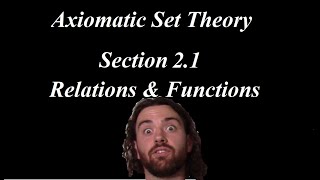
The perfect number of axioms | Axiomatic Set Theory, Section 1.1
In this video we introduce 6 of the axioms of ZFC set theory. My Twitter: https://twitter.com/KristapsBalodi3 Intro: (0:00) The Axiom of Existence: (2:39) The Axiom of Extensionality: (4:20) The Axiom Schema of Comprehension: (6:15) The Axiom of Pair (12:16) The Axiom of Union (15:15) T
From playlist Axiomatic Set Theory

Relations and Functions | Axiomatic Set Theory, Section 2.1
In this video we define and prove a few basic theorems about relations and functions. My Twitter: https://twitter.com/KristapsBalodi3 Intro:(0:00) Ordered Pairs:(1:43) IMAGE-in that!:(3:33) Composition: (7:57) Functions:(11:05) Special thanks to Alex Stephens
From playlist Axiomatic Set Theory

Axiomatics and the least upper bound property (I) | Real numbers and limits Math Foundations 120
The role of axiomatics in mathematics is a highly contentious one. Originally the term always referred to Euclid, and his use of the term to mean `a self-evident truth that requires no proof '. However in modern times the meaning of the term has shifted dramatically, to the idea that an Ax
From playlist Math Foundations

What's so wrong with the Axiom of Choice ?
One of the Zermelo- Fraenkel axioms, called axiom of choice, is remarkably controversial. It links to linear algebra and several paradoxes- find out what is so strange about it ! (00:22) - Math objects as sets (00:54) - What axioms we use ? (01:30) - Understanding axiom of choice (03:2
From playlist Something you did not know...

The Simplest Math No One Can Agree on- A Paradox of Choice
To build our mathematics we need a starting point, rules to dictate what we can do and assumed basic truths to serve as a foundation as we seek understanding of higher level problems. But what happens when we can't agree on what we should start with?
From playlist Summer of Math Exposition Youtube Videos

This video lists an explains propositional, predicate calculus axioms, as well as a set theoretical statement that goes with it, including ZF and beyond. Where possible, the explanations are kept constructive. You can find the list of axioms in the file discussed in this video here: https:
From playlist Logic

Set Theory (Part 2): ZFC Axioms
Please feel free to leave comments/questions on the video and practice problems below! In this video, I introduce some common axioms in set theory using the Zermelo-Fraenkel w/ choice (ZFC) system. Five out of nine ZFC axioms are covered and the remaining four will be introduced in their
From playlist Set Theory by Mathoma

The Axiom of Choice | Epic Math Time
The axiom of choice states that the cartesian product of nonempty sets is nonempty. This doesn't sound controversial, and it might not even sound interesting, but adopting the axiom of choice has far reaching consequences in mathematics, and applying it in proofs has a very distinctive qua
From playlist Latest Uploads

The Big (mathematical) Bang | Axiomatic Set Theory, Section 0
The introductory video for a course on the axiomatic theory of ZFC set theory. My Twitter: https://twitter.com/KristapsBalodi3 Intro: (0:00) Russel's Paradox: (2:13)
From playlist Axiomatic Set Theory

Zermelo Fraenkel Separation and replacement
This is part of a series of lectures on the Zermelo-Fraenkel axioms for set theory. We discuss the axioms of separation and replacement and some of their variations. For the other lectures in the course see https://www.youtube.com/playlist?list=PL8yHsr3EFj52EKVgPi-p50fRP2_SbG2oi
From playlist Zermelo Fraenkel axioms

Fundamentals of Mathematics - Lecture 15: Dedekind-Peano vs Peano Arithmetic
This is the class where we talk about the Extra Credit. course page: http://www.uvm.edu/~tdupuy/logic/Math52-Fall2017.html videography - Eric Melton - UVM
From playlist Fundamentals of Mathematics

Topology Without Tears - Video 2c - Infinite Set Theory
This is the final part, part (c), of Video 2 in a series of videos supplementing the online book "Topology Without Tears" which is available at no cost at www.topologywithouttears.net
From playlist Topology Without Tears

Real Analysis: Noting that we assume only naive set theory and basic properties of the natural numbers for this playlist, we give a brief account of some issues in the quest for mathematical rigor. These include the Axiom of Choice, the Law of the Excluded Middle, and Godel's Incompleten
From playlist Real Analysis

What We've Learned from NKS Chapter 12: The Principle of Computational Equivalence [Part 2]
In this episode of "What We've Learned from NKS", Stephen Wolfram is counting down to the 20th anniversary of A New Kind of Science with [another] chapter retrospective. If you'd like to contribute to the discussion in future episodes, you can participate through this YouTube channel or th
From playlist Science and Research Livestreams

Peano axioms: Can you really PROVE that 2+2=4?
How do you prove 2 + 2 = 4? I mean, it's just TRUE right? If you think this, well, Mr. Peano would like to have a word with you. Natural number game: https://www.ma.imperial.ac.uk/~buzzard/xena/natural_number_game/ This video was made for 3Blue1Brown's SoME1 competition.
From playlist Summer of Math Exposition Youtube Videos

Zermelo Fraenkel Pairing and union
This is part of a series of lectures on the Zermelo-Fraenkel axioms for set theory. We discuss the axioms of pairing and union, the two easiest axioms of ZFC, and consider whether they are really needed. For the other lectures in the course see https://www.youtube.com/playlist?list=PL
From playlist Zermelo Fraenkel axioms

This is part of a series of lectures on the Zermelo-Fraenkel axioms for set theory. We discuss the axiom of foundation, which says that the membership relation is well founded, and give some examples of the bizarre things that can happen if sets are allowed to be non-well-founded. For
From playlist Zermelo Fraenkel axioms

Set Theory 1.1 : Axioms of Set Theory
In this video, I introduce the axioms of set theory and Russel's Paradox. Email : fematikaqna@gmail.com Code : https://github.com/Fematika/Animations Notes : http://docdro.id/5ITQHUW
From playlist Set Theory